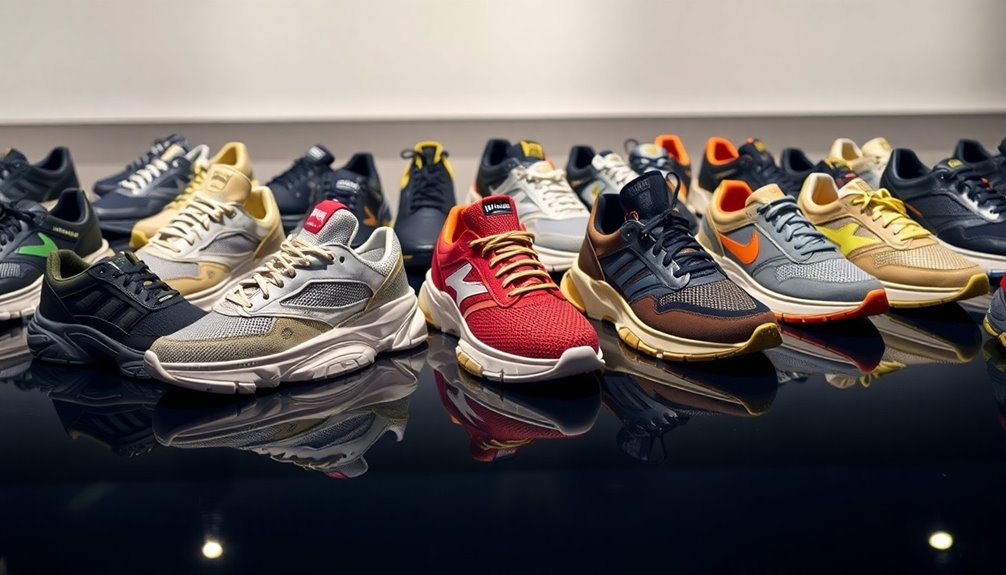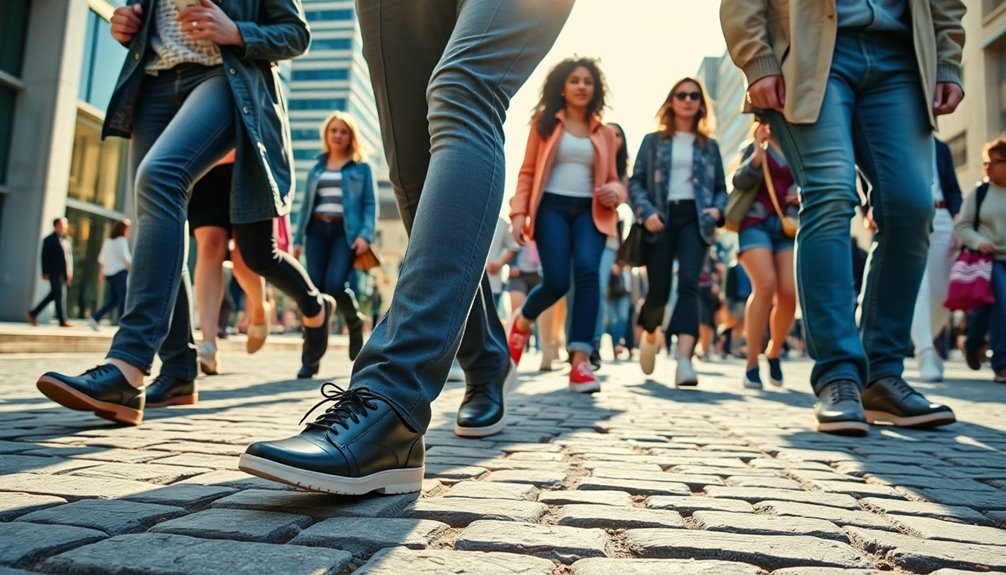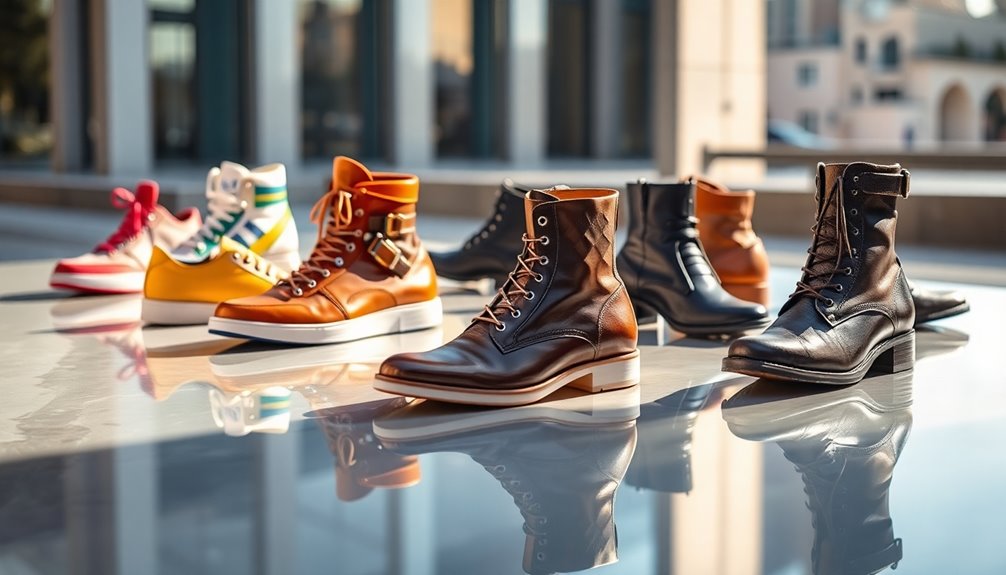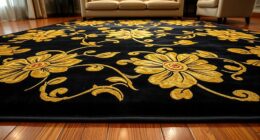Israeli footwear brands combine innovation and style in every pair, making them stand out globally. You'll find eco-friendly materials like recycled plastics and organic cotton in their designs. High-tech features enhance comfort and safety, like sensor-driven technologies that prevent falls and wearable tech for athletes. Artisans craft unique styles by merging traditional techniques with contemporary trends. Brands like Naot not only dominate locally but have also gained international attention. When you explore these brands, you'll see how their commitment to sustainability and community initiatives reflects their values, paving the way for a stylish and responsible future in footwear.
Key Takeaways
- Israeli footwear brands prioritize sustainability by using eco-friendly materials like recycled plastics, organic cotton, and bio-based alternatives in their designs.
- Innovative technologies, such as 3D printing and wearable tech, enhance functionality and customization in Israeli shoe production.
- Designers like Kobi Levi and LAX Shoes combine unique craftsmanship with contemporary style, gaining international recognition and celebrity clientele.
- Local brands like Naot demonstrate community engagement through charitable initiatives, providing shoes to IDF soldiers and supporting local charities.
- The fusion of cultural influences and artisan craftsmanship results in stylish, comfortable footwear that reflects both tradition and modern trends.
Innovative Materials in Footwear
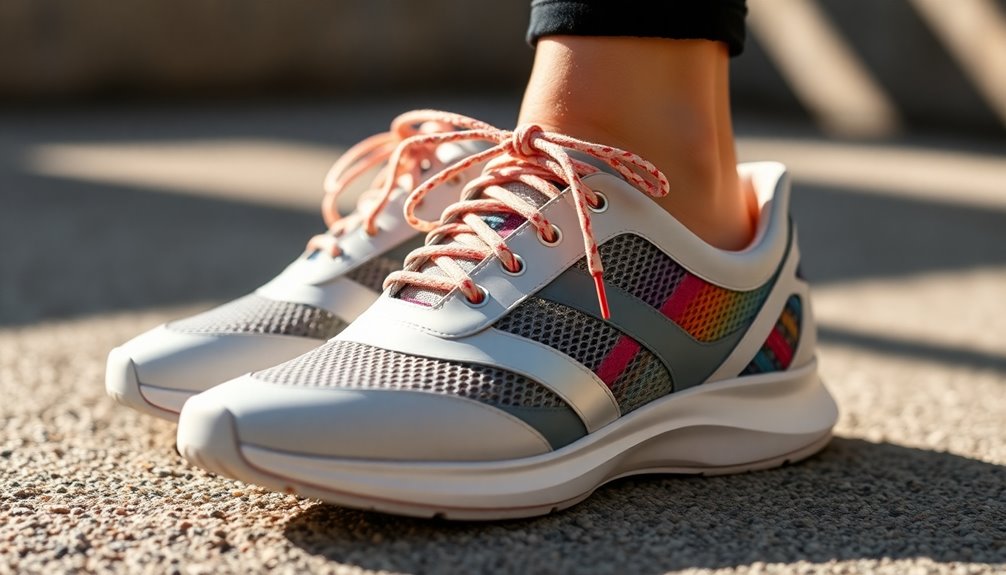
Innovation in footwear has rapidly transformed the industry, driven by a growing demand for sustainability and performance. You'll find that many Israeli brands are embracing sustainable materials, making strides in eco-friendly options.
For instance, recycled plastics from ocean waste are now woven into fabrics, reducing pollution while creating stylish shoes. Organic cotton is another popular choice, grown without harmful chemicals, ensuring a lower environmental footprint. Additionally, sustainable shoes often focus on ethical supply chain practices, which ensures fair treatment for workers involved in production.
Hemp offers durability and sustainability, requiring minimal resources for cultivation. You might also encounter cork, a renewable resource often used in shoe soles, adding comfort while being biodegradable.
Exploring bio-based alternatives, you'll see innovative materials like Piñatex, derived from pineapple leaf fibers, providing a cruelty-free option to traditional leather. Brands are also experimenting with materials like mushroom-based options and fruit waste derivatives, which help reduce waste.
Further, advancements in materials like OrthoLite Cirql™ foam enhance comfort while being biodegradable, ensuring your footwear is as eco-conscious as it's stylish.
Israeli footwear brands are truly leading the way in utilizing innovative materials, reflecting a commitment to both sustainability and high performance.
High-Tech and Medical Advances
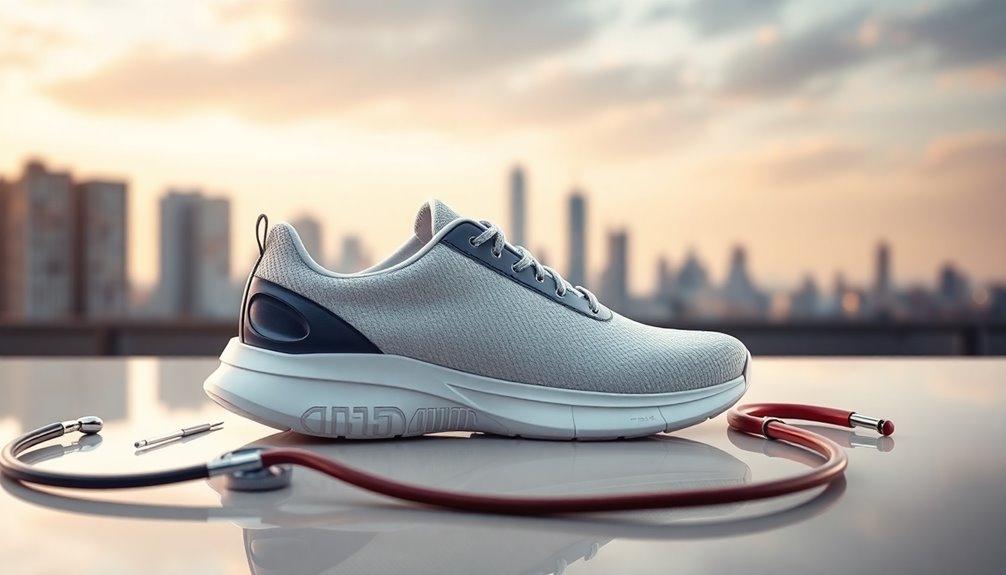
Israeli footwear brands aren't just leading the way in sustainable materials but are also at the forefront of high-tech and medical advancements.
Take the B-Shoe, for instance. Designed to reduce falls among the elderly, it features a sensor-driven mechanism that moves the shoe backward if the wearer doesn't react in time. This innovative design collects real-time data, which can be shared with healthcare professionals, enhancing safety and monitoring. The technology aims to address the fact that 1 in 3 elderly individuals experience falls annually in the U.S., highlighting its critical importance.
Another groundbreaking product is the Re-Step System, developed to help patients with cerebral palsy, stroke, and brain injuries regain proper walking techniques. By randomly altering foot angles and sole height, it promotes brain elasticity and balance, while software tracks gait parameters and progress.
Israeli brands also embrace wearable technology, collaborating with institutions like Tel Aviv University to enhance athletic performance. Embedded sensors in shoes collect data on posture and steps, offering personalized training insights.
Furthermore, innovations like scan-to-fit technology improve shopping experiences by providing accurate size recommendations, which can drastically reduce returns.
These high-tech and medical advances showcase how Israeli footwear brands aren't just about style but also about improving health and safety in innovative ways.
Fashion Trends in Israeli Shoes
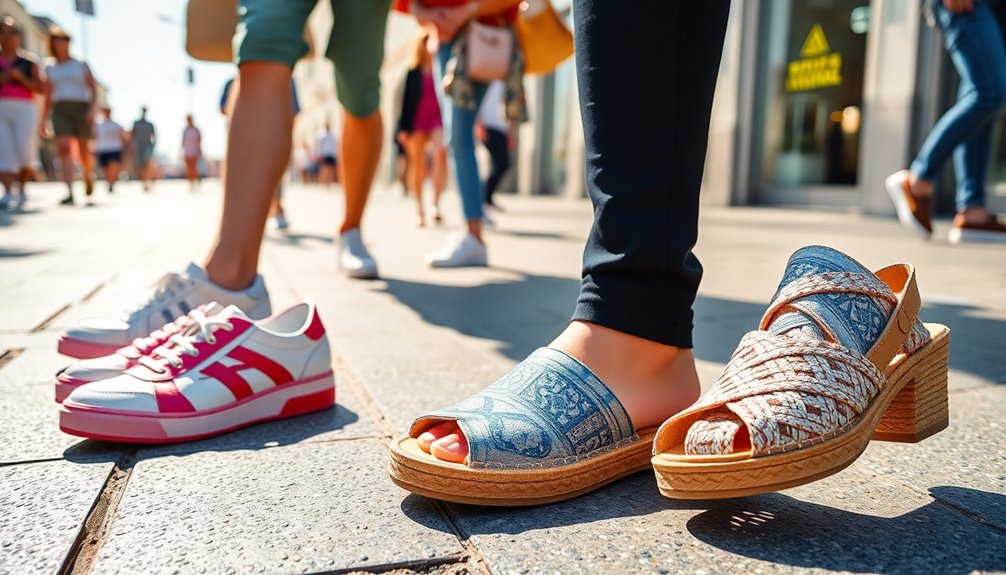
Amidst a backdrop of cultural influences and evolving consumer preferences, fashion trends in Israeli shoes reflect a unique blend of comfort, practicality, and identity.
You'll often find that Israeli footwear prioritizes casual and comfortable styles, ensuring you feel great on your feet all day long. Brands like Naot use high-quality materials, such as cork and natural latex, to create durable and comfortable soles. This commitment to comfort aligns with the rise in demand for plus-size and one-size-fits-all garments in the fashion industry.
Functional designs, like the trendy Blundstones, originally made for laborers, showcase practicality while providing the support and stability you need. Versatile options like Teva Naot and Shoresh sandals make it easy to transition from walking to hiking without missing a beat.
Cultural elements also seep into these trends; for instance, the unpolished look reflects a casual aesthetic, while bright colors occasionally pop up in designs. Brands often embrace mixed media, enhancing the style and functionality of their shoes.
Furthermore, Beautifeel combines elegance with comfort, catering to your desire for stylish footwear. With a nod to national pride and traditional roots, Israeli shoes embody a spirit that resonates with both local and global consumers.
Local and Global Brand Presence
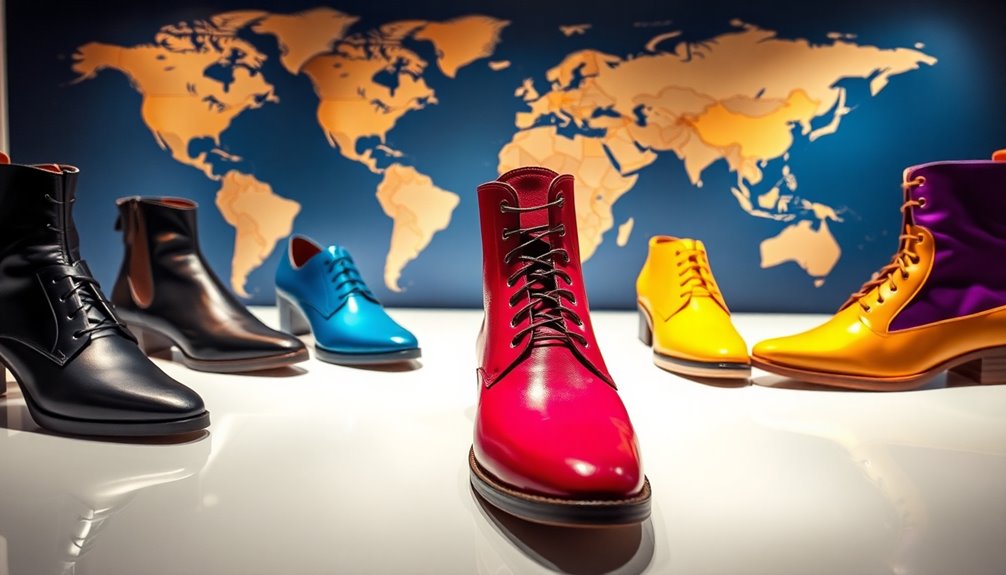
The footwear landscape in Israel isn't just about comfort and style; it also showcases a dynamic local and global brand presence.
You'll find that local brands like Naot and shoesonline.co.il dominate the Israeli market, with the latter generating all its revenue from domestic sales. In fact, the top online stores, including shein.com and ksp.co.il, accounted for significant revenue in 2023, highlighting a thriving local e-commerce scene.
On the global front, Naot has transformed from a small factory into a leading manufacturer and exporter, reaching customers worldwide. Designers like Kobi Levi attract international attention, boasting celebrity clients such as Lady Gaga. Notably, brands like LAX Shoes are recognized for their ability to create a dreamy aesthetic while maintaining comfort.
You'll notice that brands like Lucca by Noa Luria and Tamar Shalem have also carved niches for themselves in the global market, thanks to their unique designs and sustainable approaches.
In this vibrant landscape, Israeli designers often collaborate with international talent, blending local craftsmanship with global influences.
Whether you're shopping locally or exploring global offerings, you'll appreciate how Israeli footwear brands balance tradition and innovation, making their mark both at home and abroad.
Education and Training of Designers
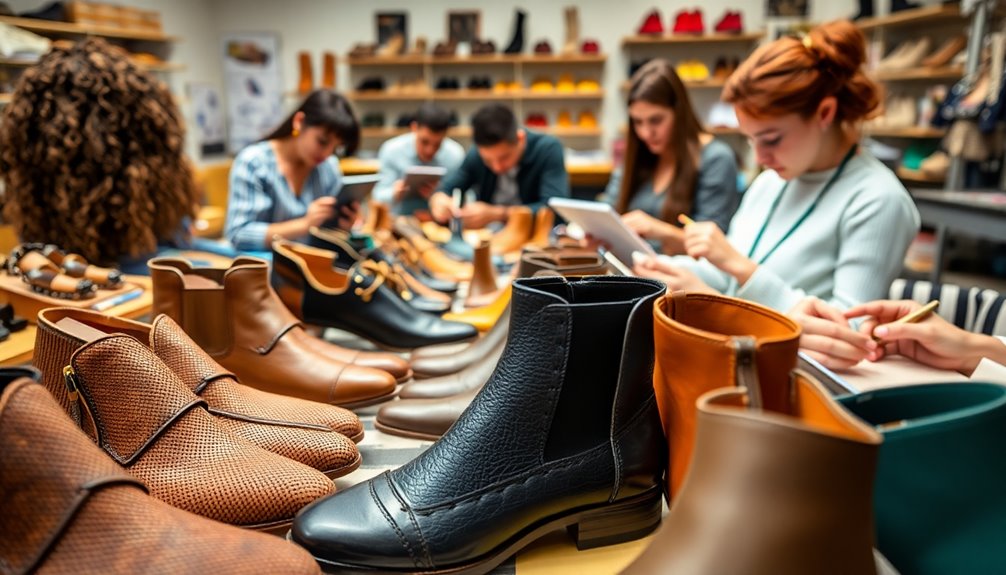
In Israel, aspiring footwear designers benefit from a comprehensive education that covers the entire spectrum of fashion design. You'll start with foundational courses that introduce you to the language of fashion, while specialized footwear courses dive deep into shoe design, including drawing techniques, 3D modeling, and collection planning.
Interdisciplinary learning is key here, as you can choose electives in areas like photography, product design, and visual communications. Practical and theoretical skills are emphasized, guiding you through the complete production process of shoes and accessories.
Hands-on training is paramount; you'll master drawing techniques and engage in workshops that focus on collection planning and trend research. Internships in the fashion industry are integrated into your studies, offering invaluable practical experience.
You'll attend industry events, participate in master classes, and collaborate on real company briefs, ensuring you're well-prepared for the competitive landscape. With a strong focus on innovation, quality craftsmanship, and customer-centric design, your education positions you to create footwear that resonates in both local and global markets. Additionally, this education supports the development of sustainable practices that emphasize eco-friendly materials and ethical manufacturing processes.
This blend of skills and experiences makes you a standout designer in today's fashion industry.
Environmental Impact of Footwear
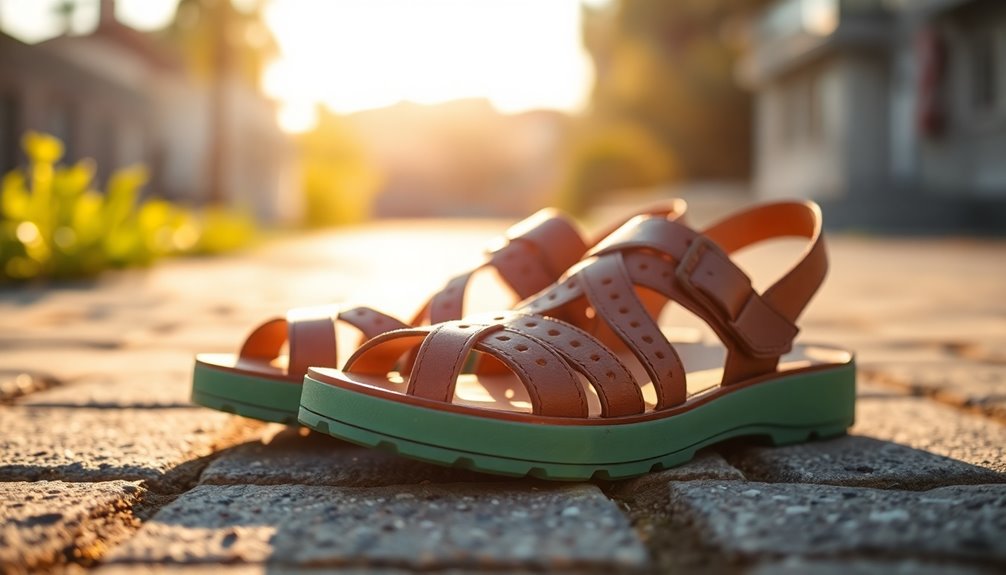
Footwear production significantly impacts the environment, often in ways you mightn't expect. You might think of style and comfort first, but the materials used play a crucial role. Up to 40 different materials, including leather, rubber, and synthetics, are used in making shoes, each with its own environmental footprint.
For instance, leather production is water and chemical-intensive, while rubber plantations contribute to deforestation. Synthetic materials, derived from petrochemicals, not only consume a lot of energy but also lead to microplastic pollution.
The manufacturing process adds to the problem with high energy consumption, primarily from fossil fuels. Producing just one pair of shoes can generate around 30 pounds of carbon dioxide. With over 15 billion shoes produced annually, the footwear industry accounts for 1.4% of global greenhouse gas emissions. Vegan footwear typically has a lower environmental footprint compared to traditional options.
Disposal issues further compound the environmental impact. With only about 5% of shoes being recycled, the majority end up in landfills, where they can take hundreds of years to decompose.
As they break down, they leach harmful chemicals, damaging ecosystems. Recognizing these factors can help you make more informed choices when purchasing footwear.
Sustainable Production Practices
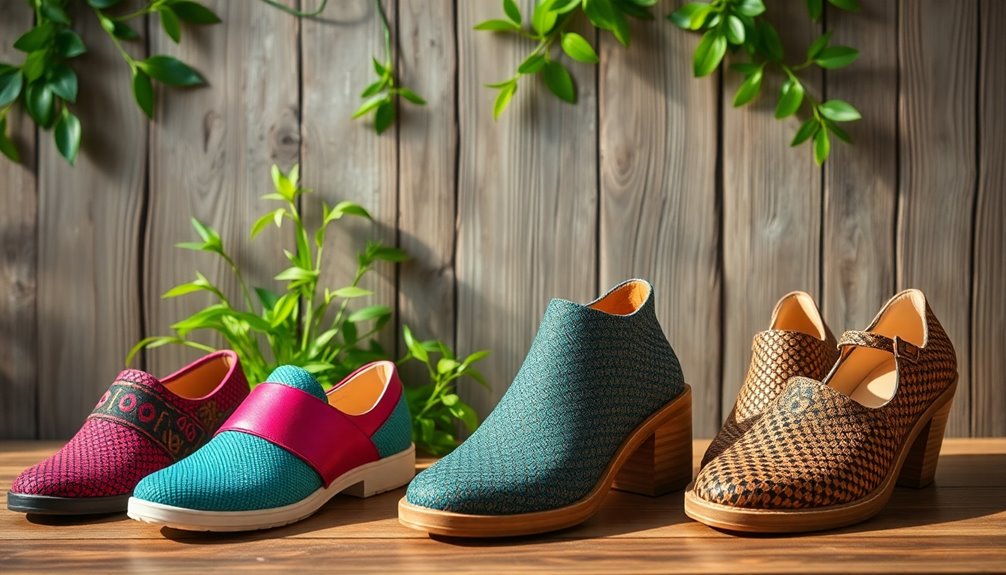
Sustainability in production practices is transforming how shoes are made, focusing on reducing environmental footprints while maintaining style and comfort.
You'll find that many Israeli footwear brands are embracing biodegradable materials like BioCir, which decomposes without leaving harmful waste. They also utilize compostable plastics and natural ingredients, ensuring products like cinnamon-scented flip-flops break down safely. The global biodegradable plastics market, valued at $4.3 billion in 2021, is driving innovation in sustainable footwear options.
Innovative manufacturing processes play a crucial role too. With 3D printing, brands can craft complex, fully compostable designs, enhancing both sustainability and aesthetics.
Companies are adopting green chemistry and automated production methods to minimize waste and improve efficiency. VOC-free materials are becoming the norm, allowing for cleaner production.
Moreover, the sustainable supply chain emphasizes waste reduction through practices like industrial composting. Shoes can be returned to stores for complete biodegradation, while recycled materials, such as Parley Ocean Plastic, are increasingly incorporated into designs.
Circular design principles ensure products remain in use rather than becoming waste.
Unique Craftsmanship and Design

Embracing unique craftsmanship and design, Israeli footwear brands stand out not just for their aesthetics but for their cultural significance.
You'll find that many designs draw inspiration from ancient archaeological finds, blending traditional styles with contemporary flair. Artisans in Israel handcraft each piece, ensuring that every pair of shoes—whether it's a biblical-style sandal or a modern sneaker—reflects meticulous attention to detail. Notably, these sandals offer wearers a chance to walk in the footsteps of Jesus, enhancing their spiritual journey.
The use of premium natural leather in shades of brown, black, and tan adds to the uniqueness, as the leather molds to your feet for exceptional comfort.
With innovative materials like lightweight synthetic fabrics, breathable mesh, and shock-absorbent foam, these brands create footwear that's not only stylish but also functional. Advanced techniques, including 3D printing, allow for springy platforms and heels that enhance your walking experience.
You'll also notice artistic elements in the designs. From ballerina shoes featuring modern patterns to textures resembling a pony's mane, each pair tells a story.
This fusion of classic and modern aesthetics, combined with high-quality craftsmanship, guarantees that you're not just wearing footwear—you're stepping into a piece of art.
Community and Health Initiatives
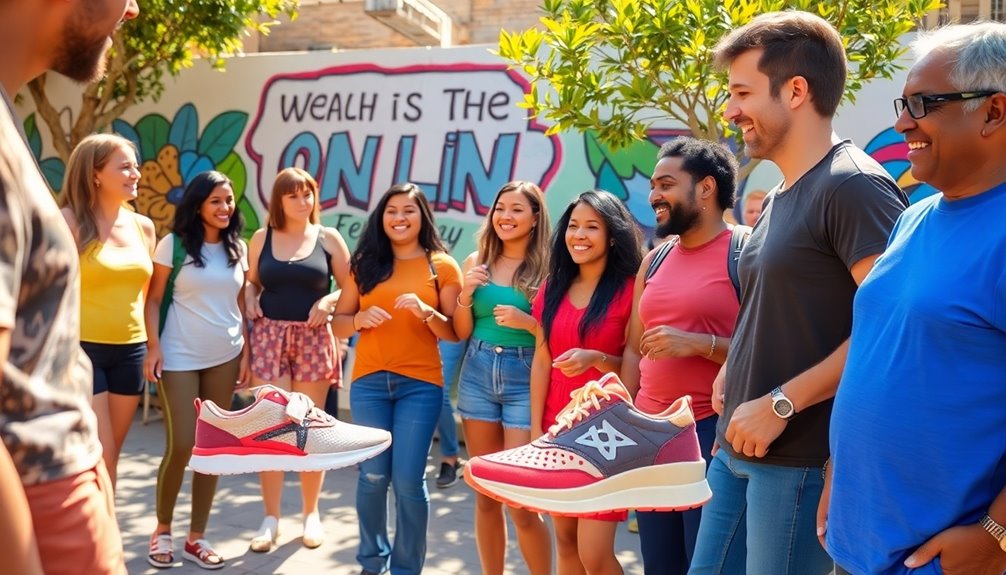
In recent years, Israeli footwear brands have increasingly focused on community and health initiatives that reflect their commitment to social responsibility. One standout is the "Boots for Israel" initiative, which sends over 30,000 pairs of high-quality boots to IDF soldiers. You can get involved in packing events and fundraising efforts across the US, where students often include letters and donated thermal socks with the boots, fostering a sense of unity among diverse congregations. This initiative has shipped an average of 270 to 320 duffel bags weekly, significantly impacting the morale and safety of soldiers in need.
Local charities also benefit from these brands, as seen in Naot's donation program. They regularly donate between 150 to 500 pairs of shoes each week to those in need. They've even organized shoe donation events in response to disasters, like Hurricane Ian, demonstrating their proactive approach to community welfare.
Moreover, brands like Shaamli Footwear prioritize environmental health by using renewable materials like carbon-neutral cork.
Meanwhile, Oribuff introduces cutting-edge, eco-friendly manufacturing processes that ensure worker safety. By committing to these initiatives, Israeli footwear brands not only enhance their community impact but also lead the way in sustainable practices, making a difference in the lives of many.
Frequently Asked Questions
What Are the Price Ranges for Israeli Footwear Brands?
When you're exploring Israeli footwear brands, you'll find a variety of price ranges.
For Naot, expect comfort sandals from $18 to $40, while handmade Jafa sandals range from $165 to $270.
If you're into minimalist options, Vivobarefoot starts at $120.
Lems boots and hiking sneakers range from $90 to $190, and Xero models can be found for $50 to $80.
Keep an eye out for discounts and shipping options!
Where Can I Find Reviews of Israeli Shoe Brands?
You can find reviews of Israeli shoe brands on various platforms.
Start with online retailers like Zappos and Stan's Shoes, where customers share their experiences.
Check out specialty blogs like The Barefoot Shoe Review for detailed comparisons.
Don't forget to visit brand websites, such as Naot and Vivobarefoot, for customer testimonials.
Local shoe stores in Tel Aviv also provide opportunities to try on shoes and read customer feedback in person.
Are There Any Israeli Footwear Brands That Offer Custom Sizing?
You won't find any Israeli footwear brands that offer custom sizing options.
While many international brands provide personalized fit solutions, Israeli brands tend to focus on unique designs and minimalist styles.
Designers like Kobi Levi create artistic shoes that express creativity rather than cater to individual sizing needs.
Brands like Earth Runners and Barefoot Life prioritize comfort and natural movement but don't offer custom sizing either.
How Do I Care for Eco-Friendly Shoes?
To care for your eco-friendly shoes, use natural cleaners like baking soda or vinegar to avoid harsh chemicals.
Regularly clean them with a damp cloth and mild soap to maintain their condition.
Apply a water-repellent spray for protection, and store them properly to extend their lifespan.
Rotating your shoes helps minimize wear, and using shoe trees keeps their shape.
Remember to air dry instead of using a dryer to prevent damage.
What Are the Return Policies for Online Purchases of Israeli Footwear?
When you buy footwear online, you'll want to know the return policies.
Generally, you can return items within 30 days if they're in original condition, with tags and packaging. However, for hype products, you've got just 14 days. Make sure they're unworn!
Follow the return instructions on the website, and remember, you may need proof of purchase.
Shipping fees for returns are usually your responsibility unless the item's defective.
Conclusion
In conclusion, Israeli footwear brands truly embody the fusion of innovation and style. By embracing cutting-edge materials and sustainable practices, they not only set trends but also prioritize the environment and community well-being. The commitment to high-tech advancements and unique craftsmanship ensures that every pair you wear is a statement of quality and creativity. So, whether you're stepping out in fashion or seeking comfort, you can feel good knowing you're supporting a brand that's making a difference.
